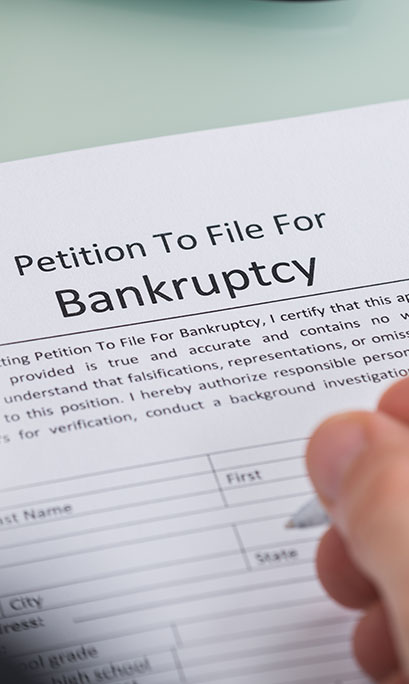
PH: (847) 549-0600 FX: (847) 589-2263 Info@LawJTLG.com

Who Should File Bankruptcy
There are various reasons why someone might need to consider filing for bankruptcy; medical catastrophe, a lapse in insurance coverage, barrage of credit card debt, failing business, or even a slight loss in income may ultimately make filing bankruptcy a necessary step in order to restore financial stability in one’s household.
For those consumers who have found themselves in financial distress, the time to explore whether bankruptcy is an appropriate remedy is sooner, rather than later. The social stigma associated with bankruptcy, particularly following the Great Recession, has to a large extent, tapered off, but that certainly does not retract from the internalized shame and frustration many potential bankruptcy candidates have to grapple with. The burden is real, but for many debtors, the solution to recapturing one’s financial livelihood can be found in the U.S. Bankruptcy Code.
To the extent any of the following scenarios accurately describes a hardship you are currently, or on the verge of suffering through, you may wish to consult with a bankruptcy attorney.
If you or anyone you know is presently or is about to suffer through any of the above listed financial hardships, bankruptcy debt relief may be an appropriate remedy. Chapter 7 and Chapter 13 Bankruptcy, often referred to as “debt liquidation bankruptcy” and “debt reorganization” or “repayment” bankruptcy, will stop collection efforts as soon as your case is filed. You will also be able to protect many assets in the bankruptcy process from encircling creditors. This will give you much needed peace of mind knowing that your wages can no longer be garnished, property cannot be seized, nor will your checking account be frozen any longer.
The Chapter which the debtor should file will depend on many different factors some of which are described in more detail in the following sections.
Chapter 7 Bankruptcy
As referenced above, Chapter 7 Bankruptcy is most traditionally referred to as the “liquidation” bankruptcy. This means that debts that the consumer debtor is unable to continue making will be dischargeable, and the Debtor will not be submitting monthly payments in accordance with a payment plan drafted by the debtor and her attorney for court approval.
Rather, the debtor files a petition listing all income, expenses, assets, and debts, and the Bankruptcy Trustee “liquidates” (sells) assets and pays off your creditors to the extent possible with the amounts recovered from the sale of your non-exempt assets. The bankruptcy trustee is the person appointed by the court to oversee your case whose primary objective is to find non-exempt (unprotected) property to sell for the benefit of your creditors.
To be clear, although there is always a possibility that you may lose property in a Chapter7 bankruptcy, for most Chapter 7 petitioners, they have exhausted their financial resources and have nothing left to give. The good news is, that even if you have a car, or a house, or some cash, or retirement proceeds, you should be able to exempt most if not all of the equity in this property. For instance, you may exempt (protect from bankruptcy liquidation) up to $15,000.00 in equity in residential real estate. That means that if you own a house worth $200,000.00 with a mortgage of $185,000.00, you should easily be able to protect that equity and protect your house from your creditors. If you are behind on mortgage payments, however, you may wish to consult a foreclosure defense attorney or seriously consider Chapter 13 bankruptcy.
If Chapter 7 bankruptcy is seriously being considered by the debtor, they may not necessarily be able to proceed with a Chapter 7 unless they pass the bankruptcy “means test” and “ability to repay test.” The bankruptcy means test looks at your household size (number of members) and your household gross monthly income and compares it to the average gross monthly income of families of the same size in your geographic area. If you make under the gross monthly income average for your household size, you presumptively qualify for Chapter 7 Bankruptcy. If you make over the median income threshold, you may still qualify if you can demonstrate special financial circumstances consume whatever disposable monthly income you have leaving you without the ability to repay your creditors.
Chapter 13 Bankruptcy
Chapter 13 bankruptcy is the “repayment” plan bankruptcy which allows a debtor to get caught back up on past due debts; examples such as tax debts, car payments, or mortgage payments. Another important distinction between Chapter 13 and Chapter 7 bankruptcy, is that generally, in a Chapter 13 bankruptcy, the debtor is not at risk of having his or her property liquidated for the benefit of the debtor’s creditors— that’s what the repayment plan is for.
In terms of the length of the repayment plan, it largely depends on the Chapter 13 filer’s income and assets. There are only two terms available; the repayment plan may last for 36 or 60 months. In no event will a plan last longer than 60 months. If you make over the median income for your household size, your plan will end up being a 60 month repayment plan. On the other hand, if you make under the median, your plan can be for 36 months‐under median debtors can submit a repayment plan for more than 36 months if they wish, such as when a 36 month plan may not be sufficient to pay back non-dischargeable debts, or more is needed to be paid in order to protect a certain asset.
Contact the Libertyville and Gurnee Bankruptcy Attorneys at Johnston Tomei Lenczycki & Goldberg LLC
Whatever the reason may be, Johnston Tomei Lenczycki & Goldberg LLC has attorneys on staff with extensive bankruptcy experience who will be able to assist you in your quest to seek out debt relief.
Phone Number: (847) 549-0600
Fax Number: (847) 589-2263
Libertyville Office
350 N. Milwaukee Ave., Ste. 202
Libertyville, IL 60048
Manchester Office
2100 Manchester Road, Suite 920
Wheaton, IL 60187